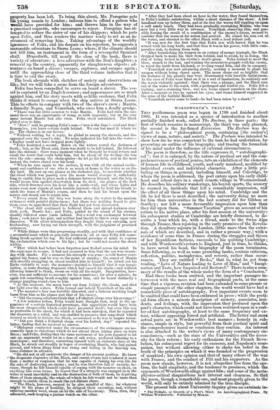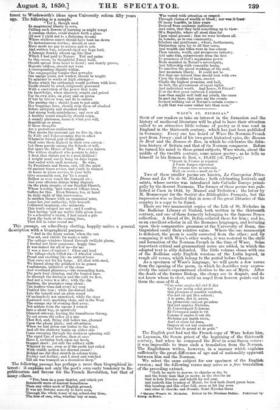WORDSWGRTIL'S, PRELUDE. * DIM- posthumous poem was begun in 1799 and,
finished abOnt- 1805. It was intended as a species- of introduction to another artia]ly finished work, called The Recluse, in three parts ; the first of which remains in manuscript, the third was only planned, the second is the far-famed Excursion. The Recluse was de- signed to be a "philosophical poem, containing. [the author's] views of man,. nature, and society." The Prelude was intended to. show how far he was competent -to the task he had undertaken, by, presenting an outline of his biography; and tracing the formation- of his mind under the influence of external circumstances.
The poem is therefore, as the title expresses it, " autobiographi- cal " ; but it is enlarged, by the nature of poetical art and the com- prehensiveness of poetical genius, into anexhibition of the elements of human life in childhood, youth; and-early manhood, modified by individual events and individual character, After a little pre- luding on things in general, including himself, and Coleridge, to' whom the poem is addressed, the poet enters upon his early child-; hood and school days in a small remote village in Westmoreland.- He describes his solitary-wanderings, his boyish sports, the scenery: he roamed in; incidents that left a remarkable impression; mid.' the effect of all these things upon his mind. Cambridge and the life he led there is next described ; the university doing no more for him. than universities in- the last century did. for Gibbon or Southey ; nor left a more favourable impression upon him than.- they did upon. them. " Summer-Vacation" gives an account of-his return to his native place, after his first session at the imiversi 'his subsequent studies at -Cambridge are briefly dismissed, to scribe a tour which he, with a friend, made to the Swiss Alps through' France, then rejoicing in the early promises of the Revolu, tion. A desultory sojourrrin- London, (little more. than the exter- nals of which are described, and in rather a-prosaic way,) residence of some time in France during the struggles and throes of her Republican factions, succeeds to his quitting Cambridge ; and with Wordsworth's return to England, just in time, he thinks' to have saved his head, the biography of the-poem terminates. Some following, as well. as-some preceding books, contain criticism,, reflection, politics, metaphysics and reverie, rather, than occur- rences. They are entitled. "Rooks," thati
:s,. what he, got from. reading, "Love of Nature leading to Love of .:Man,' and " Imagi, nation and Taste, how Impaired and Restored." There is also a sum.- mary of the results of.the. whole 'under the form of a "Conclusion." Had. these books been omitted, and the important passages in-
terwoven with the more real and biographical parts, at the same. time that a vigorous revisiom had beemextended. to some prosaic or simple passages of'the-other chapters, the world would have had a- remarkable piece of autobiography'' Few important events seem to be omitted that could have been embraced in prose ; while the poeti- cal form allows a minute description of scenery, associates, inci- dents, and feelings, with the impression. they produced upon the poet's character, whioh.could• not have .been ventured upon in a mat- ter-of-fact • autobiography, at least to the seine frequency and ex- tent, without appearing forced and artificial: The better and _more aotual parts are in Wordsworth's best manner.; homely in. sub- stance, simple in style, but powerfulfrom. their poetical spirit and. the comprehensive moral or oonolusion they contain. An interest is also attached to the writer's views of nmny contemporary eir- cumstances,—such as the state of the Universities and.the neces- sity for their reform ; his early enthusiasm, for the French Rove- lution,-his subsequent regret for its excesses, and Napoleon's usur- pation; but without allowing either to .shake- his belief in the truth of the principles on which it was founded "or the progression. of mankind; his own opinion. and that of many others of the war with France, and. the conduet of Pitt and his supporters. As the poem now stands,, however, it is not altogether free from the ego- tism, the.bald simplicity, and the tendency to prosiness, which the opponents of-Wonleworth allege against-him; and some of the meta, physico-critical disquisitions lack interest and clearness. SO that the poem, though a remarkable one, and most properly given to the- ' world, will only be entirely admired by the true disciple. The present talk about University inquiry gives an. extrinsic in-.
• The Prelude, or Growth of a Poet's Mind. An Autobiographical_ Poem. BY
William Wordsworth. Published by Mozon.
terest to Wordsworth's ideas upon University reform fifty years ago. The following is a sample.
"Yet I, though used Dimagisterialliberty-to rove,
Culling, such flowers of learning as might tempt A-random choice, could shadow forth a place (If now I yield not to a flattering dream) -Whose studious aspect should have bent me down_ To instantaneous service; should at once Have made me pay to science and to arts Atukwritten lore acknowledged my liege lord, A':homage franklyoffered up, like that 'Which I had paid to Nature. Toil and pains -
• In this recess, by thoughtful Fancy built, • Should spread from heart to heart ; and stately groves, Majestic edifices, should not want Atorrespondiiig dignity within. The congregating temper that pervades Our unripe years, not wasted, should be taught To minister to works of high attempt- Worka.which the enthusiast would perform with love. Youth-should be awed, religiously possessed With a conviction of the power that waits On knowledge when sincerely sought and prized
For its. sake, knowledge, on glory and on praise If but by labour won, and fit to endure The palming, day ; should learn to put aside
Her trappings here, should strip them off abashed Before antiquity and steadfast truth And strong book-mindedness and over all A healthy sound simplicity should reign • A seemly plainness, name it what you Republican or pious. If these thoughts Are a gratuitous emblazonry That mocks the recreant age we live in then Be Folly and False-seeming free to affect Whatever formal gait of discipline
Shall raise them highest in their own esteem : Let them parade among the Schools at will, But spare the House of God. Was ever known The witless shepherd who persists to drive A flock that thirsts not to a pool disliked ? A weight mud surely hang on days begun And ended with such mockery. Be wise, Ye Presidents and Deans, and, till the spirit Of ancient times revive, and youth be trained At -home in pious service, to your bells Give seasonable rest, for tis a sound Hollow-as ever vexed the tranquil air ; And your officious, doings bring disrace On the plain steeples of our English Church, Whose worship; mid remotest village trees, Suffers. for this Even Science, too, at hand. In daily sight of this irreverence,
Is. smitten thence with an unnatural taint, Loses her just authority, falls beneath Collateral suspieion, else unknown. This truth escaped me not ; and I confess, That having 'mid my native hills given loose To a schoolboy's vision, I had raised a pile Upon the basis of the coming time, That fell in ruins round me."
This passage on schoolboys skating, happily unites a general (lesaiption with a biographical purpose.
"And in the frosty season, when the sun Was set,' and visible for many a mile The cottage-windows blazed through twilight gloom, I heeded not their summons : happy time It was indeed for all of us—for ma It was a time of rapture ! Clear and loud The village-clock-tolled wheeled about, Proud and exultin,g like an unfired horse That cares not for his home. All shod with steel, We hissed along the polished ice in games Confederate, imitative of the chase And woodland pleasures,—the resounding horn, The• pack loud chiming, and the hunted hare. So through the darkness and the cold we flew, And not a voice was idle; with the din
Smitten, the precipices rang aloud ; Theleafleas trees and every icy crag Tinkled like iron ; while far-distant hills
Into the tumult sent an alien sound Of melancholy not unnoticed, while the stars Eastward were sparkling clear, and lathe West The.orange sky of evening died away. Not seldom from the-uproar I retired Into a silent bay, or sportively Glanced sideway, leaving the tumultuous throng, To out across the reflex of a star.
That fled, and,, flying still before me, gleamed
Upon the glassy plain-; and oftentimes,
%en we had given our bodies to the wind, And-all the shadowy banks on either-side Came sweeping through the darkness spinning still The rapid line of motion, then at once Have I reclining back upon my heels, Stopped short: yet still the solitary cliffs Wheeled by' me, even as if the earth had rolled
With,visible motion-her diurnal round !
Bbhind me did they stretch.in solemn train, Feebler and feebler; and I stood and watched Till all was tranquil as a dreamless sleep."
The following passage has perhaps a more than biographical in- terest : it explains not only the poet's own early tendency to Re- publicanism and. favour for the French Revolution, but that . of Many others.
"For; born spoor-district, and: whieh:yet Retaineth more of ancient homeliness. Than any other nook of English ground, It was my fortune scarcely to have seen, Through thewhole tenor of my, school-day time, 'The Lace of one, who, whether boy or man; Was vested with attention or respect Through claims of wealth or -blood; norwes itteast" Of many benefits, in later years
Derived from academic institutes And rules, that they-held something up to view.: Of a Republic, where idl stood thus far Upon equal.ground; that we were brothers all In. honour,, as in. one community, Scholars and gentleman ; where, furthermore,
Distinction open lav to allthat -came, And wealth and titles were in lees esteem
Than talents, worth, and prosperous industry. Add unto this, subservience from the first To presences of God's mysterious power Made manifest in Nature's sovereignty, And fellowship with venerable books, To sanction the proud workings of the soul, And mountain liberty. It could not be
But that one tutored thus should look with awe
Upon the faculties of man, receive Gladly the highest promises, and hail„ As best, the government of equal rights individual ividual worth. And hence, 0 Friend !
If at the first great outbreak I rejoiced- Less than might well befit my youth, the cause
In part lay here, that unto me the events
Seemed nothing,out of Nature's certain course- A.gift that was come rather late than soon."



























 Previous page
Previous page